

Growing up in a small town near Knoxville, Tennessee, I had two older siblings and a younger sister, Suzie. Conceived not long after I was born, Suzie shares something with me—for five weeks every year, we’re both the exact same age! Naturally, being so close in age, Suzie and I were wild things—partners in crime—although ours were childish misdemeanors. Still, the two of us caused an awful lot of parental anguish and hand wringing. In retrospect, I realize our parents let us get away with more than most of our friends’ parents. I guess you might say we were benignly spoiled.
I’ve loved stories for as long as I can remember. My favorites were those my mother made up at nap time, thinking them up as she went along, desperate to please me. I was also mad for my father’s telling and retelling of family history and lore, often embellishing his stories for dramatic impact.
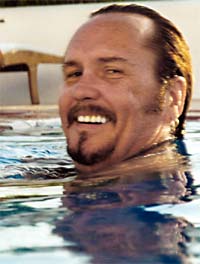
Me: a Pisces in a Gemini’s body.
Since I loved to read, I was very lucky that the house I grew up in had a library, although we never called it that. We simply referred to it as the “book room.” For me, it was by far the most interesting room in the house, and its contents occupied a great deal of my time. My own first “book,” which I put together when I was eight years old, was made of brown construction paper and was about the poet, John Milton, who fascinated me because he could write despite having been blind.
Another great love of mine was movies. I was especially enthralled by films about Indians, and had a preference for Cherokees, since they had once lived in that part of Tennessee. In my early teens, I was sent to Camp Sequoia, near Asheville, North Carolina, and I became fascinated by the Indian lore I picked up. In fact, the camp was named after the very chief who created the Cherokee alphabet.
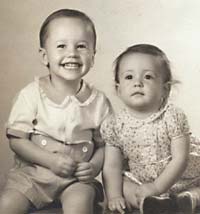
Me with Suzie; you’d never believe the mischief we got into!
Is it any wonder then, that decades later, when I first laid eyes on the country property in upstate New York (which was to become Judith Gould’s home base), the first words out of my mouth were: “It’s Camp Sequoia!” For the complex of creek side barns, sheltered beneath a row of towering white pines, and the picturesque dirt road on which horseback riders trot by, had taken me right back to my childhood.
It’s amazing, the tidal pull which childhood exerts upon us in later life. For instance, when I was growing up, my family had a beautiful wooden cabin cruiser built by Chris-Craft. I adored the weekends spent on the Suzie Q, from which we swam, and aboard which we ate and slept, often tied up alongside the boats of friends. At night, Suzie and I would pull back the porthole curtains in our cabin and from our bunks spy on our parents as the adults partied on the adjoining (and usually larger) boat. Perhaps that explains why you will find boats appearing and reappearing in various Judith Gould novels.
I suppose another throwback to childhood which pops up in some of Judith Gould’s novels (particularly in A Moment in Time), is my love for all things equestrian. Though no great athlete, I have always loved horses and am addicted to riding—and have survived being thrown so many times that I long ago lost count.
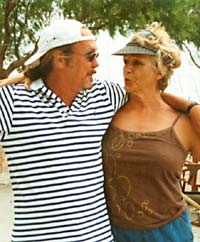
After my divorce I moved in with Louise; a happily married mom, she’ll still travel with an old pal.
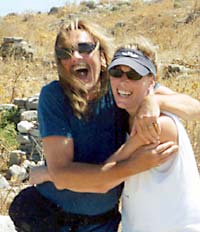
With friend Kate, at an archeological dig in Greece.
I won’t bore you with my years in college, my degrees, my doctoral work at the University of Florida, or my failed marriage (which lasted two-and-a-half years). Suffice it to say that I woke up one morning and decided I wasn’t cut out for the bland world of academia. So I pulled up stakes, sold everything I owned, blew most of my money on foolish good-bye parties, and arrived in New York City—in a snowstorm, on a New Year’s Eve, with fifty dollars to my name.
New York, New York! I’d visited the city several times and was in love with its energy, its melting pot of diversity, and what I believed were its limitless possibilities. Deep down inside I knew that here, not some stifling university campus, was where I belonged. That this was where I could make a new start and forge a career out of my favorite activity—writing. Not writing gobbledy- goop for obscure, high-brow journals which nobody read. No. I wanted to write to entertain! I wanted my writing to be read and enjoyed by the public at large, not just by a handful of college professors! But most importantly, I wanted to write...well, I wanted to write the kinds of books I liked to read.
For the first two weeks, I camped out at a friend’s while I hunted for a job. My fifty dollars was soon gone, spent on linguine and cottage cheese! Then Jack Geasland, a childhood friend and neighbor from Tennessee, who was now living in New York City (how I used to envy him!) told me there was an opening for an office temp at the medical publisher where he worked. Would I be interesting in temping?
Would I ever! Oh...and could I borrow fifty dollars until payday?
Before long my temporary job became full time, and I found myself gainfully employed as an editorial assistant. A promotion followed and I was made an assistant editor, which entailed writing three articles a month for one of the publisher’s trade magazines. That was all fine, well, and dandy, but I needed a more creative outlet—as well as an additional income.
As luck would have it, I found a second job—writing reviews for a small give-away entertainment magazine. The pay? Ten dollars per review. Not exactly big bucks, even way back when, but so what? I was happy as a bug in a rug. And why? Because every night for two entire years, I got to see a different Broadway or Off-Broadway play, opera production, ballet, or other venue of performance art—without having to buy a single ticket! Then, burning the midnight oil, I would write my reviews.
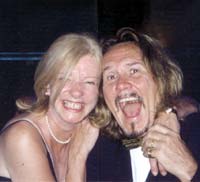
Making new friends aboard the real-life Dreamboat.
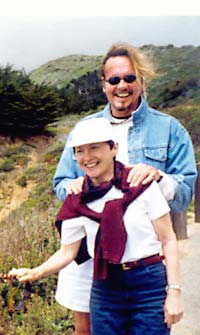
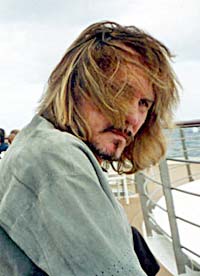
Believe it or not, those two years taught me more about writing than the ten years I spent on college campuses. One snag. There wasn’t any time left over for writing novels! Clearly, something had to give. It did: I gave up my day job and became a freelance copy editor and proofreader. Then my childhood buddy Jack, who had found me my day job, introduced me to his friend, Lucy Gaston.
From that moment on, my life was forever changed. Lucy truly was Auntie Mame come to life—complete with an assortment of eccentric friends. I accompanied her on jaunts to Europe—always in search of the unique, the beautiful, the exceptional, the divine...but never, ever, the ordinary. I quickly learned to see the world through her enormously experienced and sophisticated eyes. A great beauty some thirty years older than me, she had spent decades among the most accomplished and celebrated people of their day, whether in the arts or otherwise, had mingled with the White Russian nobles who had been exiled after the revolution, and had been a fixture in international society, although she defied categorization. Fact is, she would have snorted derisively at being called a socialite. And it was Lucy who prodded my friend Jack and his colleage, Bari Wood, into writing Twins, which eventually became the film, Dead Ringers.
And it was Lucy, with her infallible nose for matching talents, who ultimately saw to it that Nick Bienes and I should work as co-authors. So she introduced us, and naturally, she was proven right, as usual.
At the time we met, Nick was working on a novel and after I read it, I had no doubts whatsoever about his talent as a writer with commercial appeal. Of course, the first thing we did was to use each other as springboards and began to brainstorm—coming up with ideas for yet more novels. And we haven’t stopped using each other as springboards ever since.
Nick’s first order of business? Throwing away the book he had been working on for two years so that we might begin with a clean slate!
That act—seeing all that work go into the wastebasket—left me breathless, but I’ve never regretted it, because our first effort together was Sins, which became an international bestseller.
Two of the questions I’m most often asked as a writer are, (1) How can two people write on one book? and (2) How can you, as a man, write about women?
The answers are simple. (1) We both have our strong points, and each of our talents complements the other’s. And, (2) we don’t write about women. We write about the human heart and mind. (I might add that it’s been helpful to have had a wife, two sisters, a mother, and lots of girlfriends—besides which, Nick is a sort of Ann Landers. Every woman—and man—I know constantly relies upon him for advice about their love life!) Maybe he knows something I don’t know, but I do know his life can be quite a mess. But as he’s the first to tell you, “I never take my own advice.”
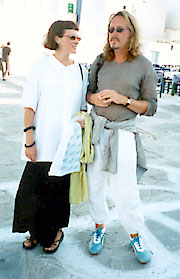
Me and My Pal: On a shopping expedition on Mykonos, pondering
which store Nancy and I (we’re both world-class shoppers!) will raid
next!
|
Truer words were never spoken. Anyway, after more than two decades of working together, living separately and together, and at one point even living on two different coasts, we up and moved from the maelstrom that is Manhattan to the quiet of the Hudson Valley, where we recklessly bought a barn complex—which I fell madly in love with, as I already mentioned earlier, because it reminded me of my beloved Camp Sequoia. (Nick, on the other hand, ever the European and a romantic, proclaimed: “Dacha!” and without a second thought whipped out his checkbook.)
Were we brave? Or incredibly stupid? We haven’t figured that one out yet, although friends think the place is magic. But let me tell you: turning these gigantic, connected barns into a home has been—and still is—a daunting challenge, as you can see in the Before and After photos below. And it’s not near halfway to completion. But it has also been the source of constant inspiration, as has the beautiful countryside in which it is situated. It’s as much an ongoing adventure as are our travels to distant places—feeding our hearts, minds, and creativity—and the creativity of our friends—in wondrous ways. Because leaving the city doesn’t necessarily mean you have to go the Green Acres route, does it?
This Old Barn is Home Sweet HomeBefore |
After |
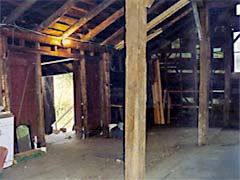 Where rows of Summer Stock Theater seats once filled the barn...
|
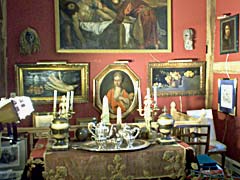
|
...and then an Arts Center resulted in student-crafted makeshift windows and flea market junk... |
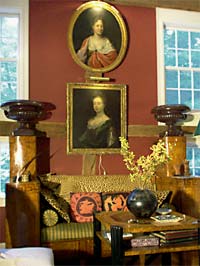 ...a living room in Little Red Riding Hood red now comfortably seats over thirty family members and friends |
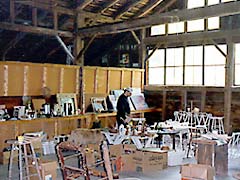 |
|